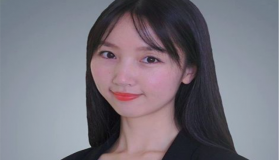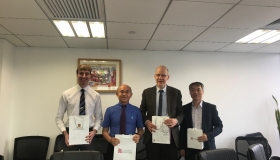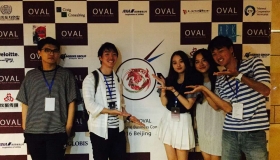Hult Prize Greater Bay Area Innovation Challenge 2019 Drawn to a Successful Close in CUHK-Shenzhen

Group Photo of Closing Ceremony
The 2019 Hult Prize-GBA Innovation Challenge was held at The Chinese University of Hong Kong, Shenzhen (CUHK-Shenzhen) in May 24-26. The focus was on three social challenges nowadays, intergenerational harmony, economic empowerment, and barrier-free accessibility. 240 college students, 54 teams from 25 colleges and universities in the Greater Bay Area (GBA) were invited to participate in the competition. Three teams, STAR, Millionaires and G-knot have won the champion, second winner and third winner separately.
Introduction
Hult Prize is honored as one of the "five global creative ideas" by Time Magazine. It is a global initiative for budding young social entrepreneurs from leading universities and colleges around the world to sustainably solve the world’s most critical social challenges. In the last decade, Hult Prize has invested more than $50 million into social innovation through these global activities and encouraged more than a million young people to rethink the future of business. Hult Prize cultivates innovative and revolutionary ideas in colleges and universities of more than 100 countries.
Over the past few years, Hult Prize has become the biggest student competition worldwide. With a strong focus towards the Greater Bay Area, Hult Prize Greater China is a new addition to the global map in 2009. Co-organized by Hult Prize Greater China and CUHK-Shenzhen, the challenge aims to build up a societal community in the area and to inspire young talents to create profitable business plans.
Opening Ceremony
The opening ceremony was formally held at 1:00 p.m. on May 24. The organizer invited Mr. Xu Dingkai, the head of the Greater China Region, and Professor Michael Ferguson, Senior Associate Dean of School of Management and Economics, CUHK-Shenzhen to give an opening speech. The two speakers both mentioned that Social Innovation was the general trend of the times, and the development of the Greater Bay Area would provide more opportunities for the talents here. They hoped that students could grasp the opportunities and explore their potential. They also mentioned that this experience was unique for networking, the students should cherish this opportunity and maintain the contacts, treating it as one of the most precious resources in their life journeys.
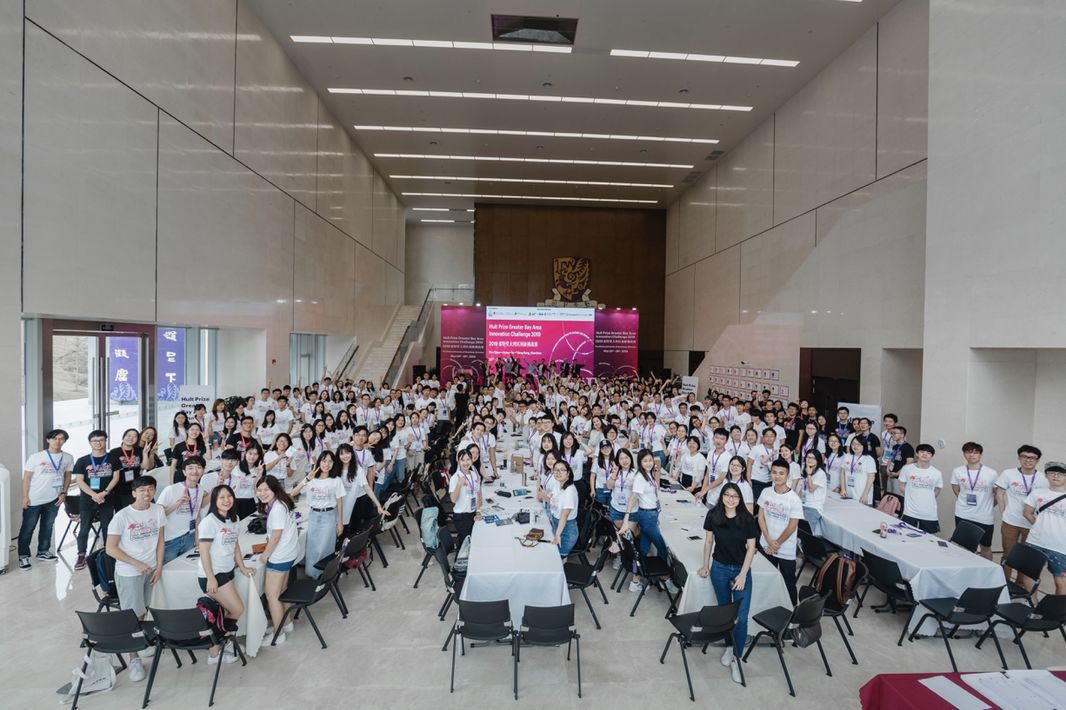
Group Photo of 240 Students from 25 Universities and Colleges of the Greater Bay Area in the Opening Ceremony
Hack for Inclusion – GBA InnoChallenge 2019 Rundown

The Judges
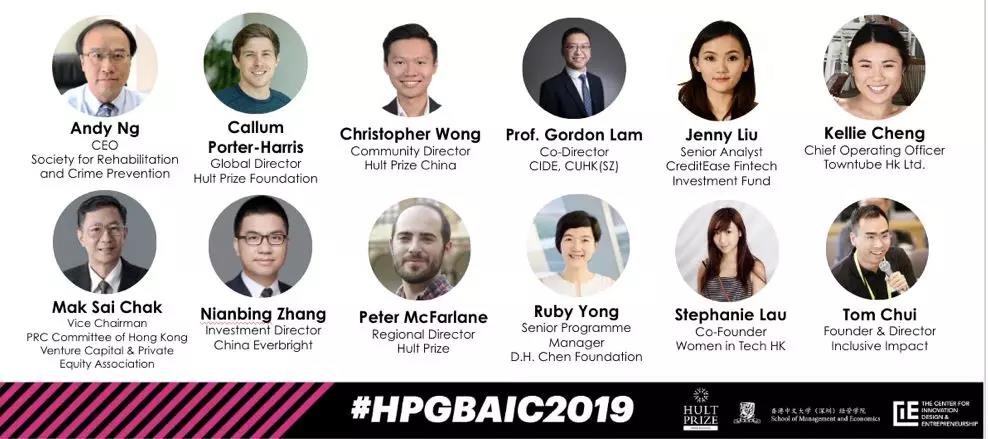
Hong Kong: The University of Hong Kong, The Chinese University of Hong Kong, City University of Hong Kong, The Hong Kong University of Science and Technology, The Hong Kong Polytechnic University.
Shenzhen: The Chinese University of Hong Kong, Shenzhen, Graduate School at Shenzhen, Tsinghua University, Peking University Shenzhen Graduate School, Harbin Institute of Technology, Shenzhen, Southern University of Science and Technology, Shenzhen University, Shenzhen Tourism College of Jinan University.
Guangzhou: Sun Yat-sen University, Guangdong Polytechnic Normal University, Guangdong Medical University, South China Agricultural University, South China Normal University, Jinan University, South China University of Technology.
Macau: University of Macau, Macau University of Science and Technology.
Zhuhai: United International College, Zhuhai Campus, Sun Yat-sen University, Zhuhai College of Jilin University.
Shantou: Guangdong Technion, Israel Institute of Technology, Shantou University.
Winning Teams

Zhang Yujie, Chemical Engineering and Technology, Guangdong Technion, Israel Institute of Technology
Wang Yuxin, Chemical Engineering and Technology, Guangdong Technion, Israel Institute of Technology
Wang Xinyao, Chemical Engineering and Technology, Guangdong Technion, Israel Institute of Technology
Yang Feng, Chemical Engineering and Technology, Guangdong Technion, Israel Institute of Technology
Project Introduction
Project Introduction: Intergeneration bridge is a platform which provides after-class courses for children of labors by old people. Our target customers are migrant labors who are in low income and lack of time. They cannot afford the expensive price of child-care center, so normally children stay at home alone. We solve trusteeship problems by providing different kinds of courses. We will select elders who are willing to join our project. What they gain are not only money but the sense of achievement, company and happiness. We use alternating shifts for elders to teach children and our teaching place is in the university of senior citizens or activity center.
Second Winner – Millionaires

Ke Junyu, School of Science & Engineering, CUHK-Shenzhen
Wang Juntao, School of Science & Engineering, CUHK-Shenzhen
Wang Yaxuan, School of Management and Economics, CUHK-Shenzhen
Huang Yuxuan, School of Management and Economics, CUHK-Shenzhen
Li Fangyu, Financial Engineering, CUHK-Shenzhen
Project Introduction
In China, wheelchair people rarely go outside because they lack a tool to show them a safe and convenient path to the places they want to go. So we want to develop an APP called “WheelCare”. WheelCare collects the locations of wheelchair-friendly and wheelchair-unfriendly infrastructures, and analyzes data to achieve the goal. Furthermore, it will contain functions like rating and traveling. We charge consulting and advertising fee. We start from Longgang district and wheelchair people, then expand to bigger areas and larger groups. Generally, WheelCare can contribute to the improvement of wheelchair-unfriendly infrastructures and raise the awareness of society to help wheelchair people.
Third Winner - G-knot
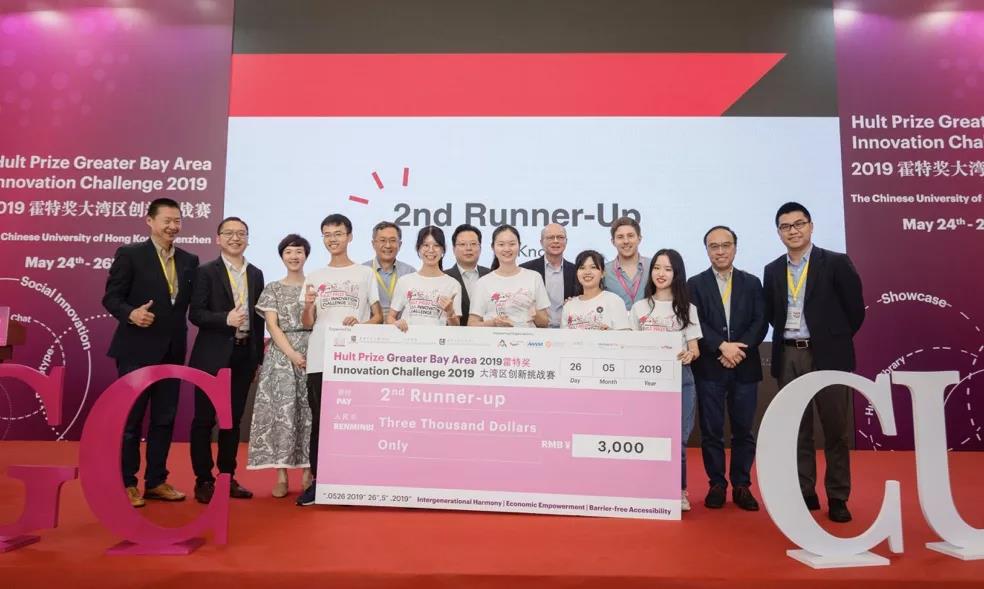
Tang Xingyu, South China Normal University,
Chen Ke, School of Management and Economics, CUHK-Shenzhen
Liu Yingtong, Law, Shenzhen University
Ru Jingyao, Law, South China Normal University
Gu Xinyue, Urban and Rural Planning, South China University of Technology
Project Introduction
To promote intergenerational harmony between parents and left-behind children, G - Knot design a mini-program based on family members, which can Promote communication between parents and children through games. By simulating the family scene, design of generations of sharing and together create a clock in the task and the way to build a left-behind online community, the mini-program improves the working parents and family atmosphere of left-behind children, exploring the Internet big data guide family trait of the construction of the new model. In the future development, G - Knot will build a good business ecological environment through flow realization, the introduction of merchants, product extension and other ways.

For more details about the challenge and participants of CUHK-Shenzhen, please scan below QR code to watch MAXFC video.



